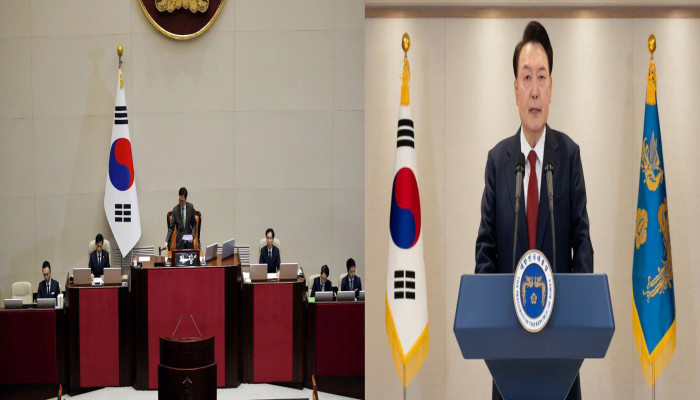South Korea's parliament votes to impeach President Yoon Suk Yeol over martial law order
- In Reports
- 02:34 PM, Dec 14, 2024
- Myind Staff
South Korea's parliament voted on Saturday to impeach President Yoon Suk Yeol. This comes as authorities investigate allegations of rebellion related to his controversial martial law decree issued on December 3, which has caused significant political unrest in the country.
The National Assembly passed the impeachment motion with 204 votes in favour and 85 against. After the document outlining the impeachment is delivered to President Yoon and the Constitutional Court, his presidential powers and duties will be temporarily suspended. The court has 180 days to decide whether to remove Yoon from office or give him back his authority. A nationwide election must be called within 60 days to select his successor if he is removed from office. Yoon's impeachment motion was put to a vote in the National Assembly for the second time.
Yoon escaped an impeachment vote last Saturday because the majority of MPs from the ruling party abstained from the floor vote. Since then, when public demonstrations against Yoon grew and his support rating fell, some members of the People Power Party declared their plans to vote for his impeachment in a second vote. For the past two weeks, tens of thousands of people have taken to the streets of Seoul every night despite the cold, demanding President Yoon's removal and arrest. They have been shouting slogans, singing, dancing, and waving K-pop light sticks. At the same time, smaller groups of Yoon's conservative supporters, also numbering in the thousands, have been holding rallies in the city, protesting the efforts to impeach the president. Both sides have mainly held peaceful protests.
Yoon's imposition of martial law, the first in over forty years in South Korea, lasted only six hours. However, it caused major political chaos, stopped diplomatic work, and shook financial markets. Yoon had to lift the decree after the parliament voted unanimously to cancel it. Yoon dispatched hundreds of troops and police officers to the parliament after declaring martial law in an attempt to block its vote on the decree, but they retreated when the chamber rejected it. There was no significant violence. Using a legal provision that defines rebellion as the planning of a disturbance against established state institutions in an attempt to subvert the constitution, opposition groups and other experts charge Yoon of rebellion. Additionally, they claim that a South Korean president is legally only permitted to impose martial law in times of war or other similar circumstances and is not authorised to halt parliamentary activities even during martial law.
Yoon "committed rebellion that hurts peace in the Republic of Korea by staging a series of riots," according to the impeachment motion. It claimed that Yoon's declaration of martial law was intended to violate the Constitution and that his mobilisation of police and military troops posed a threat to the public and the National Assembly. Defending his martial law decision as an act of governance, Yoon vehemently denied the rebellion claims in a speech on Thursday. The conservative Yoon said that his goal was to warn the main liberal opposition Democratic Party, referring to it as "a monster" and "anti-state forces," which he claimed had used their legislative power to remove high-ranking officials and weakened the government's proposed budget for the upcoming year. “I will fight to the end to prevent the forces and criminal groups that have been responsible for paralysing the country’s government and disrupting the nation’s constitutional order from threatening the future of the Republic of Korea,” Yoon said.
Lee Jae-myung, the head of the Democratic Party, referred to Yoon's speech as a "mad declaration of war" on his own people. Yoon's imposition of martial law, the first in over forty years in South Korea, lasted only six hours. However, it caused major political chaos, stopped diplomatic work, and shook financial markets. Yoon had to lift the decree after the parliament voted unanimously to cancel it. Yoon, as president, has immunity from criminal prosecution, but this does not protect him from charges of rebellion or treason. As a result, he could be investigated, detained, arrested, or indicted for his martial law decree. However, many believe authorities won't detain him forcefully because it could lead to conflicts with his presidential security team. Yoon's defence minister, police chief and the head of Seoul's metropolitan police have been arrested for their roles in the martial law case. Other high-ranking military and government officials are also under investigation.







Comments